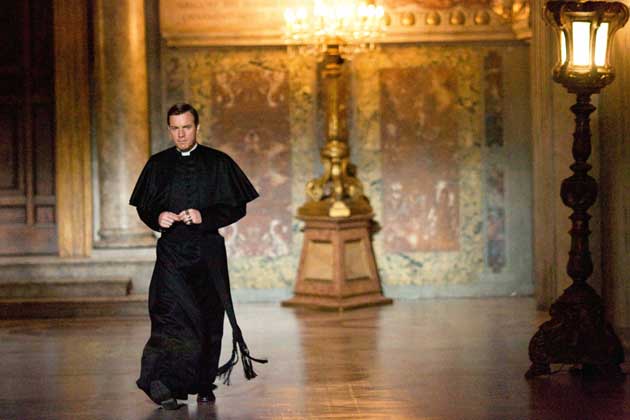Boyd Tonkin: Devilish plotting that might oust Brown
The Week In Books

If Dan Brown were a high-calorie snack food, which would he most resemble? A bucket of KFC? A battalion of deep-fried Mars bars? A sackful of cheese'n'chilli tacos? Whatever your poison, the book trade has deemed that, come September, we will all be gorging on The Lost Symbol in an international orgy of sub-literary munchies. As the film of Angels and Demons dunks us in the Brown stuff once more, and a tie-in edition flies up the charts, perhaps this grave threat to the health of the planet's cultural arteries needs its own Jamie Oliver as an antidote. How might readers enjoy the same quasi-addictive high without feeling they have steeped their system in the print equivalent of super-saturated fats?
Long before The Da Vinci Code made the shy teacher from New England into a global Godzilla of the bookstores, authors far superior to Brown had patented the recipe for border-crossing intrigue, long-buried secrets and high-level conspiracy that pivots on some hiddden key to understanding the past and controlling the present. By far my favourite novel of clandestine fraternities, spine-chilling plots and mystic revelations was written 200 years ago by a Polish adventurer, Jan Potocki: the legendary Manuscript Found in Saragossa. And it's infinitely more erotic than the prim Mr B.
More recently, Umberto Eco achieved the bizarre feat of publishing a rip-roaring pastiche of the Da Vinci Code genre years before that novel ever appeared. Foucault's Pendulum, his 1988 successor to The Name of the Rose, mixes all the requisite occult (schlockult?) ingredients with lip-smacking relish and panache – Templars, clerics, manuscripts, world-domination plans, last-minute chases and imminent global catastrophes. Not surprisingly, Eco looked on in bemused hilarity when Brown served with a straight face what he had already played for sophisticated – but still utterly engrossing – laughs.
For the conspiratorial potboiler, almost all roads lead to Rome. However silly the spectacle of TV-friendly Jesuit scholars unpicking Brown's theology and church history, at least the Vatican grasps that his appeal taps into a seam of anti-clerical suspicion that long predated the Reformation and has never yet run out. If plotters in cassocks and dog-collars float your boat, then other authors can rustle up similar dishes in more a savoury style.
The Book of Q and The Overseer by New York novelist Jonathan Rabb easily out-manoeuvre Brown in grand and dark ecclesiastical designs. Back in Italy, the labyrinthine action of Imprimatur by Rita Monaldi and Francesco Sorti "revealed" what historians had always known about the collusion between the papacy and enemies of the Catholic church in the 1680s. Rather fancifully, the authors claimed that shadowy forces in the Vatican had (naturally) conspired in secret to bury their novel – but it still somehow sold a million copies.
For page-riffling ingenuity attached to historical heft and narrative muscle, no recent conspiracy epic comes close to the Reformation romp Q by "Luther Blissett". In this case, the book's back-story surpasses in improbability anything that takes place on the page.
Named in tribute to a former Watford striker who suffered racist abuse while playing at AC Milan, "Luther Blissett" was the sobriquet of a quartet of anarchist cultural pranksters from Bologna. For some still-mysterious reason, they turned to subversive historical fiction – and succeeded mightily.
Changing their name to "Wu Ming", the group followed Q with 54, which wittily permed its knotty Cold War plot with both Cary Grant and Marshal Tito. In July, "Wu Ming" will release another show of period pyrotechnics in Britain: Manituana, which promises an Indian-centred alternative history of the American Revolution. Why wait for an emetic binge with Brown with such tasty and robust helpings of Bolognese sauce already on the table?
P.S.Geoff Chaucer, Bill Shakespeare, Charlie Dickens, Bert Lawrence: your boys took one hell of a beating. To be exact, the England Writers football team recently lost 6-1 to Germany. The drubbed squad includes Joe Dunthorne, Patrick Neate, Tobias Jones, Nicholas Royle and Marcus du Sautoy (left), whose moonlighting as Professor of the Public Understanding of Science at Oxford probably makes a right mess of his training regime. Now their coach Aidy Boothroyd (who once steered Watford FC) has vowed revenge. Another 90-minute tussle with German authors looms on 13 June, followed by joint readings at Café Oto in Dalston. Post-match, I suspect the visitors won't get past a kick-about with "Kennst du das Land, wo die Zitronen blühn" before the hosts are screaming foul and mobbing the ref. Let's hope it doesn't go to penalties.
Join our commenting forum
Join thought-provoking conversations, follow other Independent readers and see their replies
Comments
Bookmark popover
Removed from bookmarks